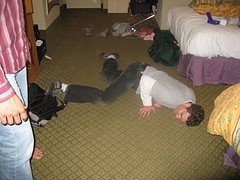I've been using RSS feeds for a long time now through my web browsers at home and work. Unlike the person who wrote the blog post about RSS (that we were directed to read--very informative!), I am content with only a limited amount of monitoring of topics and places on the web. As it is, I already spend too much time at it. My approach (at home) has been to bookmark The New York Times and The Baltimore Sun, then monitor feeds from Scientific American and Wired.com. I'm interested in lots of things, but I've found that if I set up automatic feeds about beekeeping, cheesemaking, environmental issues, etc. etc., I'd spend half my life reading things that don't interest me. When I want to know something specific, I go looking for it. The feeds I mentioned above are pure entertainment.
Having said all that, I'm having a blast working through the RSS feed suggestions on our HCPL blog (is that where they are?). I've signed up with Bloglines and have been creating a list of places to monitor, including Flickr (I'm following photos tagged with Ithaca, NY). I also made use of the feed search engine recommended there; again, I'm not likely to continue following all this, but it's fun to see how it all works.
Thursday, May 31, 2007
Wednesday, May 30, 2007
Flickr Widgets and Such
I've tried a few of the Flickr add-ons created by third parties. Now this is what I mean about worlds of creativity out there. Flickstr is a kind of Academy Awards of Flickr--Lists and access to the most popular all-time photos in Flickr. There are some remarkable images (careful, some may be offended by some images). Also, I used a Flickr feature to create HTML code for displaying the photos I'd previously uploaded to Flickr. I copied the code and pasted it into my Blogger blog (which you can all see if you look at my blog postings). I just love these things. So much better than reality TV, I can assure you.
About the Lifelong Learning Training Module
Well, I'm afraid I was not impressed with this training module (the 7-1/2 elements of lifelong learning). The information was both too obvious and at the same time not getting at the heart of the matter. I believe that lifelong learning, or simply "curiosity" about the world, is an attitude more than it is a set of learned steps and signed documents. If I have an attitude that the world is fascinating in every aspect of its being, if I can't get enough of new knowledge and skills, if I'm always drawn to try a new restaurant or dish, to try making cheese, to keeping bees, to reading lots of things on the Web, to stopping off at four or five media news and info sources every day, and on and on, then I'm a lifelong learner. If it's a chore, a responsibility, a means for fighting off Alzheimer's, something to get me a free mp3 player, or something I'm supposed to do for work, then it'll never take. Lots of people exercise for three days or jog a mile twice, then give it up. You have to have a passion for learning if you are going to do it--and if you have that passion, you don't need instructions on how to learn. It is all around you if you have the curiosity to look for it.
The Journey to the Land of Flickr
Flickr is a great example of web 2.0. I have never needed any of the photos on Flickr for anything; I just love browsing them, sometimes by subject, sometimes just by going to the Explore tab and going wherever my fingers take me. There's so much talent and beauty in the world that we never saw before web 2.0. Now the obscure mass of people of the world have a million outlets for their little bits of genius and artistic ability and just plain serendipity. Is the world richer now or what?
Just for fun, I uploaded a few photos from Linda's and my trip to England in 2006. See if you can find them.
Just for fun, I uploaded a few photos from Linda's and my trip to England in 2006. See if you can find them.
Tuesday, May 29, 2007
Enormous Excitement
I have read through the material about Web 2.0 and the 23 things, and I am both excited and impressed. Hooray for Maryland and any other state/region/county/city participating. According to Raymond Kurzweil (Google this and find out about him if you don't know him already), the rate of technology advancement is exponential-exponential (figure that one out), which means it gets faster at an ever-increasing rate (in layman's terms). As human beings we can choose either to let the wave pass over us and continue on down the beach, leaving us lying there in ignorance, or get on our mental surfboard and see where it all leads us. It'll definitely be someplace exciting.
Subscribe to:
Comments (Atom)







